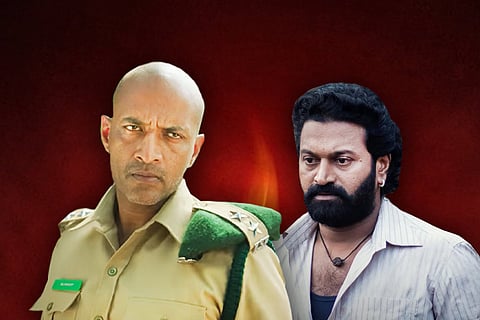

Amid a row over the portrayal of the bhoota tradition in the Kannada film Kantara, actor Kishore — who plays an important role in the film — urged against “using such a movie to incite superstition and bigotry and divide people”. In a social media post on Monday, October 24, the actor urged people to “think for a moment before falling prey to the brokers of hatred, who have already hijacked the national anthem, flag, logo and poets”. His comments come in the backdrop of a few people criticising Kantara for appropriating the bhoota tradition of the Dakshina Kannada region, and portraying it as part of the Hindu tradition.
The actor penned a post titled ‘Kantara and Dharma’, which is “a request of concern to those who are painting the color of Dharma on our Folk deities, the Bhoota of kola and the Daiva of Nema (sic)”. Earlier in October, director Rishab Shetty — who also wrote and starred as the lead in Kantara — had kicked up a row by suggesting that bhootas are part of the Hindu fold. Actor Kishore maintained a studied silence over the past few weeks while a number of right-wing commentators praised Kantara, and called it an unexpected hit alongside Vivek Agnihotri’s Kashmir Files, which focuses on the exodus of Kashmiri Pandits due to insurgency.
In his post, Kishore said, “Think for a moment before falling prey to the brokers of hatred, who have already hijacked the national anthem, flag, logo and poets, who have used and abused crores of freedom fighters including Patel, Gandhi, Bose, Nehru, just for Vote. Think for a moment before they hijack our cinemas too (sic).”
Kantara is set against the backdrop of a dominant caste landlord grabbing the land of a local tribal community. It is intertwined with the native culture and rituals practiced in coastal Karnataka. Questioning why people failed to see the portrayal of casteism and untouchability in the movie, Kishore added, “Why do we fail to see the color of Adharma (injustice) in the practice of untouchability, which does not allow the person who wears the vesha (attire) of the same daiva into the house belonging to the upper caste feudals, and the cleansing with holy water when he enters their house? (sic)” He further asked why people failed to see the dharma (religion) of Garnamu Saheb, a character in the film, and “his ultimate sacrifice by bursting a bomb to save his people”.
Like any other good movie, according to Kishore, “Kantara is uniting the people of the country surpassing the borders of caste, religion, and language. Through entertainment, people are being made aware of many social issues. By using such a movie to incite superstition and bigotry and divide people, the greatest of successes can become the greatest of failures for humanity.” Do not let movies become the pawns of bigoted politics, Kishore concluded.
Meanwhile, on Sunday, October 23, Kannada actor-activist Chetan Ahimsa was booked by the Bengaluru police for allegedly hurting religious sentiments. Responding to Rishab Shetty’s remarks on the Bhoota Kola tradition being a part of Hindu culture, Chetan had tweeted, "Glad our Kannada film ‘Kantara’ is making waves on a national level. Director Rishabh Shetty claims Bhoota Kola is ‘Hindu culture’. False. Our Pambada/Nalike/Parawa’s Bahujan traditions predate Vedic-Brahminical Hinduism. We ask that Moolnivasi cultures be shown w/truth on & off screen.” Following this, Hindu Jagaran Vedike, a right-wing outfit, lodged a complaint in the Udupi district against Chetan for hurting religious sentiments.
While the film opened to a strong audience response in its first week, Rishab Shetty's comments only came on October 15 in a Tamil interview with Cinema Viketan. In the interview, Rishab was asked about Panjurli — a bhoota that is believed to take the form of a wild boar, which is portrayed as Varaha, a Hindu god, in Kantara. He said, “The gods in Kantara are all part of our tradition and it is indeed a part of Hindu culture and rituals. Because I am a Hindu, I have belief in and respect for my religion. We have told this story through the elements present in Hindu dharma."
Bhoothas are distinct from the gods of Brahminical Hinduism, with the custom predating the arrival of vedic culture. Their stories are recorded in oral narratives or paaddanas. They are often real people who fought different kinds of injustice, such as Koti and Chanayya, Tuluva warriors who fought against caste and feudal discrimination in the late 16th century. Some of the earliest bhoothas are animals like panjurli (wild boar) and pilichamundi (tiger). It is a common belief that each bhootha controls a particular aspect of life and that praying to the appropriate bhootha will help a person overcome their problems. Bhoothas and daivas are not worshipped on a daily basis like some Hindu gods. Their worship is restricted to annual ritual festivals, though daily poojas are conducted for the ritual objects, ornaments, and other paraphernalia of the bhoothas.